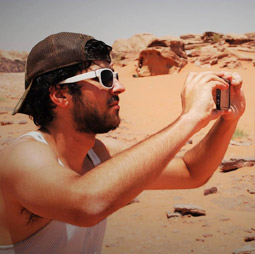How I Found Myself Teaching English in Iraq
Written By: Adam Lucente | Updated: June 29, 2023
Written By: Adam Lucente
Updated: June 29, 2023

I called up a spokesman at City University of New York (CUNY) for the I-don’t-know-how-many-time that day. I was a reporter at an online and print news outlet in Brooklyn covering the borough’s southern neighborhoods. Two years prior, I was with Kurdish soldiers advancing towards ISIS’ territory in Iraq. Writing about board meetings, sea walls, and zoning violations was equally important work, but it wasn’t what interested me.
This particular article was about a New York City councilman’s plans to host gender-segregated beach days at the university’s beach. The move sought to placate religious Jewish and Muslim residents’ desire to go the beach in beachwear, which was not religiously permissible in the company of the other sex. There was much public outcry about this in my little corner of the city, and the university spokesman told me, before anyone else, that they were rethinking the event’s legality. This became the lead of the story. It was interesting, but it didn’t do it for me.
The job was starting to take a toll on my well-being. I resented the long subway rides to and from work, especially when the train got stuck – sometimes for 30 minutes at a time. Friends and colleagues of mine were still in the Middle East. I was envious. I rarely felt proud enough of an article to share it on social media, and when I did, my followers seldom noticed. I spent years working on my Arabic, but hardly ever got to speak Arabic at my job in Brooklyn.
I decided to leave my beloved New York City again, but the question was how. I hadn’t worked in the Middle East as a reporter in two years. A lot of my sources and editors I wrote for were gone.
I thought back to my teaching days. My first job out of college was teaching English in Tunisia. I landed the job after taking ITA’s onsite course in New York. I taught in Tunisia for a year, and then switched to journalism. However, I continued teaching alongside my writing work in Jordan, where I lived after Tunisia.

After a year of being a journalist and teacher, I was proudly able to support myself solely from journalism in Iraq, Jordan, and Lebanon. I moved back to the states after a year of working in these countries, and took two jobs in local media – the latter of them being in Brooklyn.
I left my job in Brooklyn with a few leads on jobs and freelance assignments in Iraq, but I didn’t have everything solidified. At first, I did not want to teach again. I was a reporter, even though I continued volunteer teaching. The more I thought about it, though, the more I wanted to return to the classroom.
Teaching is a great way to learn about the country, for one. I never use students as sources, but they share insights in the safe classroom environment that are hard to come by elsewhere. Teaching also allows me the financial stability and professional flexibility to work on the stories I want to. Freelance payments often come months later, news outlets are downsizing across the world, and some U.S. editors are overly focused on Trump. Teaching provides regular pay so I can afford to live and pay the travel expenses for my assignments. I was offered a few staff editor jobs in the Middle East, but the jobs would have limited what I could cover.
So I decided to teach again. I’m now living, writing, photographing and teaching in Erbil, Iraq, which is the capital of the autonomous Kurdistan Region. I teach for an American nonprofit called AMIDEAST, where I also taught in Tunisia and Jordan. I get residency through my employer. I’m busy, but have enough time outside the classroom to write. I’m covering the issues of displacement and conflict that interest me. I’m helping students who have been dealt difficult hands in life learn English, so that they, too, may travel one day. I’ll go back to New York eventually, but, for now, I am living my dream teaching and writing in Iraq.
Posted In: Teach English in Middle East, Teach English in Iraq
Adam Lucente
Adam Lucente is a journalist and English-language teacher from New York City. He learned Arabic in college and has since taught in Tunisia, Jordan, and the Kurdistan Region of Iraq. As an ITA Alumni Ambassador, Adam has shared many of his experiences and insights with others interested in teaching in the Middle East through numerous articles.
Want to Learn More About Teaching English Abroad & Online?
Request a free brochure or call 773-634-9900 to speak with an expert advisor about all aspects of TEFL certification and teaching English abroad or online, including the hiring process, salaries, visas, TEFL class options, job placement assistance and more.







